Feature
4 Career Paths for Nursing Educators
Do you love teaching? This expanding field may be your calling.

If you have a passion for nursing, an aptitude for teaching, and a desire to make a difference, nursing education can be a rewarding career path, even if you can’t envision yourself lecturing in a classroom. This article explores four distinct facets of modern nursing education to help you decide where you might thrive as a nurse educator.
Hospital Nurse Educators
CLINICAL TRAINING FOR NURSING STAFF
Hospital nurse educators are clinical leaders, responsible for maintaining staff competencies, and training new employees to provide high-quality care. Typical daily tasks include developing educational content, revising policies to reflect evidence-based practice, facilitating skills fairs and classes such as CPR, and managing online learning systems. A hospital nurse educator may be asked to serve on committees and as a member of professional associations.
For these roles, employers generally look for a bachelor’s or master’s degree, substantial patient care experience, and managerial expertise.
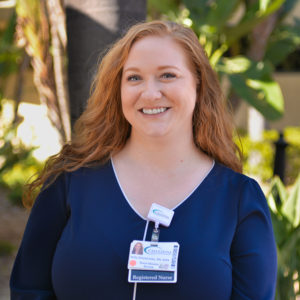 Kelly Zimmerman, RN, MSN-Ed., CRRN, is the all-staff nursing educator at Casa Colina Hospital and Centers for Healthcare in Pomona. Initially unsure how to apply her MSN, she fulfilled her desire to teach as a peer preceptor and clinical instructor. Now, she finds fulfillment in helping nurses evolve from being task-focused to thinking critically about the bigger picture. She says great teachers must be “patient and ready to adapt teaching strategies to meet different learning styles” and “should have excellent communication skills, maintain professionalism, and have a passion for ongoing education.”
Kelly Zimmerman, RN, MSN-Ed., CRRN, is the all-staff nursing educator at Casa Colina Hospital and Centers for Healthcare in Pomona. Initially unsure how to apply her MSN, she fulfilled her desire to teach as a peer preceptor and clinical instructor. Now, she finds fulfillment in helping nurses evolve from being task-focused to thinking critically about the bigger picture. She says great teachers must be “patient and ready to adapt teaching strategies to meet different learning styles” and “should have excellent communication skills, maintain professionalism, and have a passion for ongoing education.”
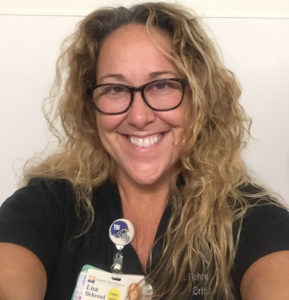 Lisa Behrend, RN, DNP, AC-CCNS, CCRN-CSC, CLSSGB, is a regional director of education for Prime Healthcare. Her position is mainly administrative: performing needs assessments, creating curriculum, and collaborating and networking within the region. However, she enjoys the occasional opportunities to provide direct education to staff. Behrend recommends gaining certification in your specialty area and in leadership. “Effective leaders know how to build teams, create rapport, and collaborate to implement and sustain processes,” she explains. If you’re invested in quality improvement and helping nurses achieve excellence, you may find the role of hospital nurse educator well worth pursuing.
Lisa Behrend, RN, DNP, AC-CCNS, CCRN-CSC, CLSSGB, is a regional director of education for Prime Healthcare. Her position is mainly administrative: performing needs assessments, creating curriculum, and collaborating and networking within the region. However, she enjoys the occasional opportunities to provide direct education to staff. Behrend recommends gaining certification in your specialty area and in leadership. “Effective leaders know how to build teams, create rapport, and collaborate to implement and sustain processes,” she explains. If you’re invested in quality improvement and helping nurses achieve excellence, you may find the role of hospital nurse educator well worth pursuing.
Hospital New Graduate/Resident Educators
TURNING NOVICE NURSES INTO PROFESSIONALS
The new grad/residency education role is similar to a hospital educator position except that your trainees are newly licensed nurses fresh out of school, undergoing the extraordinary transition from nursing student to professional.
New grad/resident educators often work closely with leadership and human resources to recruit and retain staff. Interpersonal and communication skills are essential to developing successful relationships with nursing colleges and their students, who are potential future employees. As with hospital educator jobs, this role typically requires a nursing degree — usually an MSN in education — and several years of patient care experience.






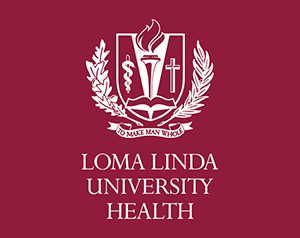


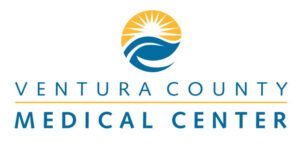


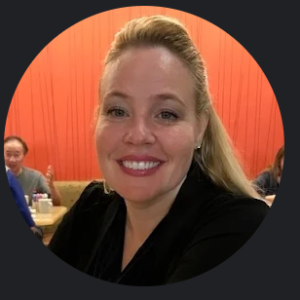 Melinda Henry, RN, BSN, CWOCN, is an educator at Northridge Hospital Medical Center. Her responsibilities include developing educational content, providing didactic teaching, overseeing clinical preceptorship, and facilitating mentorship. She notes that the needs of new graduates are more complex than those of experienced staff, requiring special consideration and an extra dose of patience. “There are so many new things for them to learn,” she says. “It can be overwhelming.”
Melinda Henry, RN, BSN, CWOCN, is an educator at Northridge Hospital Medical Center. Her responsibilities include developing educational content, providing didactic teaching, overseeing clinical preceptorship, and facilitating mentorship. She notes that the needs of new graduates are more complex than those of experienced staff, requiring special consideration and an extra dose of patience. “There are so many new things for them to learn,” she says. “It can be overwhelming.” Amrit Kamboj, RN, DNP, FNP-BC, DSD, manages the education of new nurses on a grand scale. As the national director of nurse residency for CommonSpirit Health, she oversees 141 acute care hospitals across 21 states. Kamboj says new graduate education encompasses the same components as educating general staff, with the additional elements of “professional growth opportunities, career counseling, and support for personal development.” As you forge your path as an educator, Kamboj suggests finding a mentor and seeking opportunities within your current practice. “Reach out to your education department and participate in events like skills fairs,” she says. If you have a heart for helping a novice nurse develop into a competent professional, new graduate/residency education could be a gratifying career.
Amrit Kamboj, RN, DNP, FNP-BC, DSD, manages the education of new nurses on a grand scale. As the national director of nurse residency for CommonSpirit Health, she oversees 141 acute care hospitals across 21 states. Kamboj says new graduate education encompasses the same components as educating general staff, with the additional elements of “professional growth opportunities, career counseling, and support for personal development.” As you forge your path as an educator, Kamboj suggests finding a mentor and seeking opportunities within your current practice. “Reach out to your education department and participate in events like skills fairs,” she says. If you have a heart for helping a novice nurse develop into a competent professional, new graduate/residency education could be a gratifying career.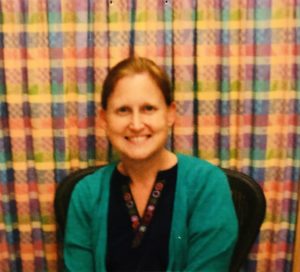 Laura Barada, RN, BSN, IBCLC, a nurse lactation educator at Huntington Health in Pasadena, has specialized in lactation for 15 of her 25 years as a NICU nurse. She says her NICU background made for a natural transition into lactation education. Gaining certification was a long process, but it helped her land her dream job. Her interest began years ago when her mother needed professional help with breastfeeding. “I was born a preemie,” Barada explains. “My mom received help feeding and then facilitated La Leche League support groups in our home. Teaching moms and babies is all I’ve ever known!”
Laura Barada, RN, BSN, IBCLC, a nurse lactation educator at Huntington Health in Pasadena, has specialized in lactation for 15 of her 25 years as a NICU nurse. She says her NICU background made for a natural transition into lactation education. Gaining certification was a long process, but it helped her land her dream job. Her interest began years ago when her mother needed professional help with breastfeeding. “I was born a preemie,” Barada explains. “My mom received help feeding and then facilitated La Leche League support groups in our home. Teaching moms and babies is all I’ve ever known!”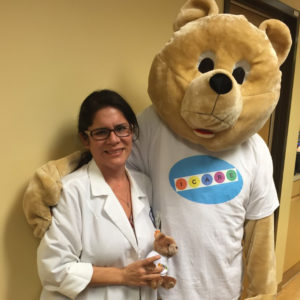 Patricia Olivos, RN, BSN, CWOCN, a wound, ostomy, and continence nurse at Kaiser Permanente Riverside Medical Center, was inspired as a nursing student when a wound care nurse guest lectured in her class. Today, Olivos provides wound care education to patients, families, and peers. She notes that as an educator, others often look to you for guidance. It’s essential to understand your limitations and scope of practice so you don’t overstep.
Patricia Olivos, RN, BSN, CWOCN, a wound, ostomy, and continence nurse at Kaiser Permanente Riverside Medical Center, was inspired as a nursing student when a wound care nurse guest lectured in her class. Today, Olivos provides wound care education to patients, families, and peers. She notes that as an educator, others often look to you for guidance. It’s essential to understand your limitations and scope of practice so you don’t overstep.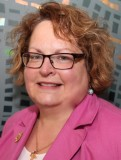 Mary Lynne Knighten, RN, DNP, NEA-BC, an associate professor in the doctoral programs at Azusa Pacific University, also serves her community as president of Faith Community Nurses International. Faith community nurses educate and assist patients through advocacy, prayer, referrals, and health counseling. Research shows that high-quality education increases quality of life and reduces disease complications, which is an especially satisfying aspect of this role. “I’ve seen people experience better health and less stress and anxiety as a result of receiving health education in the safety of the church,” Knighten says. If you have a strong interest in a specific health area — such as diabetes or childbirth — and a desire to serve the public through health promotion and disease prevention, patient and community education could be a highly rewarding career.
Mary Lynne Knighten, RN, DNP, NEA-BC, an associate professor in the doctoral programs at Azusa Pacific University, also serves her community as president of Faith Community Nurses International. Faith community nurses educate and assist patients through advocacy, prayer, referrals, and health counseling. Research shows that high-quality education increases quality of life and reduces disease complications, which is an especially satisfying aspect of this role. “I’ve seen people experience better health and less stress and anxiety as a result of receiving health education in the safety of the church,” Knighten says. If you have a strong interest in a specific health area — such as diabetes or childbirth — and a desire to serve the public through health promotion and disease prevention, patient and community education could be a highly rewarding career.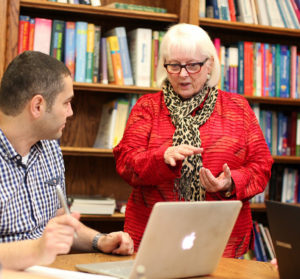 Many nursing instructors continue working in patient care to maintain clinical expertise. “Educational preparation is foundational,” says Kathleen Ruccione, RN, Ph.D., MPH, CPON, FAAN, FAPHON, a fulltime faculty member at Azusa Pacific University School of Nursing, “but in a practice profession like nursing, experience is critical.”
Many nursing instructors continue working in patient care to maintain clinical expertise. “Educational preparation is foundational,” says Kathleen Ruccione, RN, Ph.D., MPH, CPON, FAAN, FAPHON, a fulltime faculty member at Azusa Pacific University School of Nursing, “but in a practice profession like nursing, experience is critical.”